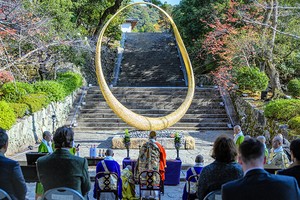Vox Populi, Vox Dei is a daily column that runs on Page 1 of The Asahi Shimbun.
January 28, 2022 at 12:45 JST
 Questions for “World History B” in this year’s unified university entrance exam conducted on Jan. 15 (The Asahi Shimbun)
Questions for “World History B” in this year’s unified university entrance exam conducted on Jan. 15 (The Asahi Shimbun)
I was stunned by the extraordinary meticulousness with which a test-taker tried to cheat on a unified university entrance exam on Jan. 15.
The perpetrator apparently chose unwitting accomplices through a tutor-matching website, told them to be on standby at a designated time and sent questions secretly photographed at the exam site for them to solve.
The test-taker tried to cheat on several subjects, including world history and English.
The trick looked like coordinating a work project with the intent of outsourcing its execution.
The internet has made it easier today to commission people far away to perform tasks.
One example would be U.S. corporations subcontracting programming to IT engineers in India.
It helps keep labor costs down, aside from the obvious convenience of being able to receive a finished product by the next morning for an order placed in the evening in the United States.
In the latest cheating case, university students were told to get the job done for free, ostensibly to confirm their tutoring abilities.
It appears the culprit also intended to save on something else: the time and effort to prepare for the exam, such as expanding one's English vocabulary.
But was that worth the time spent on planning the scam and the risk of getting caught while taking photographs of questions?
American anthropologist David Graeber (1961-2020) argued that advances in science and technology have given rise to meaningless jobs, including “taskmasters,” who just assign work to others.
It feels as if the test-taker mimicked this type of job.
A 19-year-old female student surrendered to police on Jan. 27, claiming responsibility.
The case awaits investigation, but one thing we should bear in mind is that digital technology tends to spawn innovations of the wrong sort.
--The Asahi Shimbun, Jan. 28
* * *
Vox Populi, Vox Dei is a popular daily column that takes up a wide range of topics, including culture, arts and social trends and developments. Written by veteran Asahi Shimbun writers, the column provides useful perspectives on and insights into contemporary Japan and its culture.




















A peek through the music industry’s curtain at the producers who harnessed social media to help their idols go global.
A series based on diplomatic documents declassified by Japan’s Foreign Ministry
Here is a collection of first-hand accounts by “hibakusha” atomic bomb survivors.
Cooking experts, chefs and others involved in the field of food introduce their special recipes intertwined with their paths in life.
A series about Japanese-Americans and their memories of World War II